The Blue Bird Inn was an institute for Detroit musicians and a hearth for the Black community. Detroit Sound Conservancy is telling the bar’s story.

THE INSTITUTE OF THE DETROIT SOUND
Updated 16 December 2020
In 1937, African American Alabama migrant, laborer, grocer, machine operator, and entrepreneur William Dubois (c. 1878-1937) and his wife Pinkie Dubois (c. 1882-1946) combined, adapted, and reused the buildings at 5019 and 5021 Tireman into a neighborhood bar and restaurant that featured live music called The Blue Bird Inn. Fellow Black Alabama natives Clarence Eddins (1918-1992) and his wife Mary Eddins (1922-2003) took over ownership from William’s son Robert “Buddy” Dubois (c. 1904-1956), carrying out significant external and internal modern renovations. The Bird was an institute for musicians who would influence global modern music and a hearth of freedom for the Black community within a deeply racist and heavily segregated post-Depression and post-WWII Detroit.
In 2020, The Bird was named a local Historic District by the City of Detroit. (You may read the final report here.) We continue to gather archival sources, especially around the numerous local and national alumni who performed at the club, in preparation for completing a National Register nomination in 2021. This is very much a work in progress. If you have any questions, edits, or additions, please contact us at info@detroitsound.org or call direct at 313-757-5082.

Pianist and griot Harold McKinney (1928-2001) enters The Blue Bird Inn 1982. Screenshots from “The Detroit Jazz Legacy Concert” produced by Ron Alpern / Executive Producer Juanita Anderson / A production of WTVS and Jefferson Chalmers Concerts by the River / Detroit Educational Television.
Blue Bird Local Alumni
Joe Alexander*, saxophone
Terri Allen*, voice
Willie Anderson*, piano
Albert Aarons*, trumpet
Dorothy Ashby, harp
“Miles [Davis] stayed here quite a while,” Dorothy Ashby recalls, “and influenced everybody around. And the Blue Bird got the Jones brothers often. Name jazzmen would come and sit in, and there were the great battles with instruments.” (Blonston 1967)
Will Austin*, bass
Clarence Beasley*, piano
Gino Biandi*
Stanley Booker*, piano
Thomas “Beans” Bowles*, saxophone and flute
Joe Brazil*, saxophone
Roy Brooks*, drums
Detroit Jazz Alive Performance 1993
Paul Brown*, bassist
Don Bryson*
Kenny Burrell*, guitar
William “Billy” Burrell*, bass
Hindal Butts*, drums
Donald Byrd*, trumpet
The young Detroiters played the Blue Bird, the Club Sudan, the Rouge Lounge, the World Stage and any other club. For [Donald] Byrd and his band, “There were always ample place to play, more so than any city I can name. There are still more places to play, more so than any city I can name. There are still more places that accept jazz in Detroit than we have full-time jazz clubs in New York,” he says. “In Detroit, it wasn’t that you had to play rhythm and blues. You could play jazz, it was respected, and you got away with it.” (Blonston 1967)
And we were analyzing, why is it that this town of all cities would have — because it’s out of the way — and why is it that it became the music center? And I was talking to some people today — actually I would say that when somebody, one of these days, sits down and writes the history they will find out that this town has produced more talent of musicians than any other city in America — on a one-to-one basis. You got more people that come out of Detroit in the music-entertainment field than any place in the world. (Quoted from Detroit Jazz: Ancient to Future produced by American Black Journal , 1981)
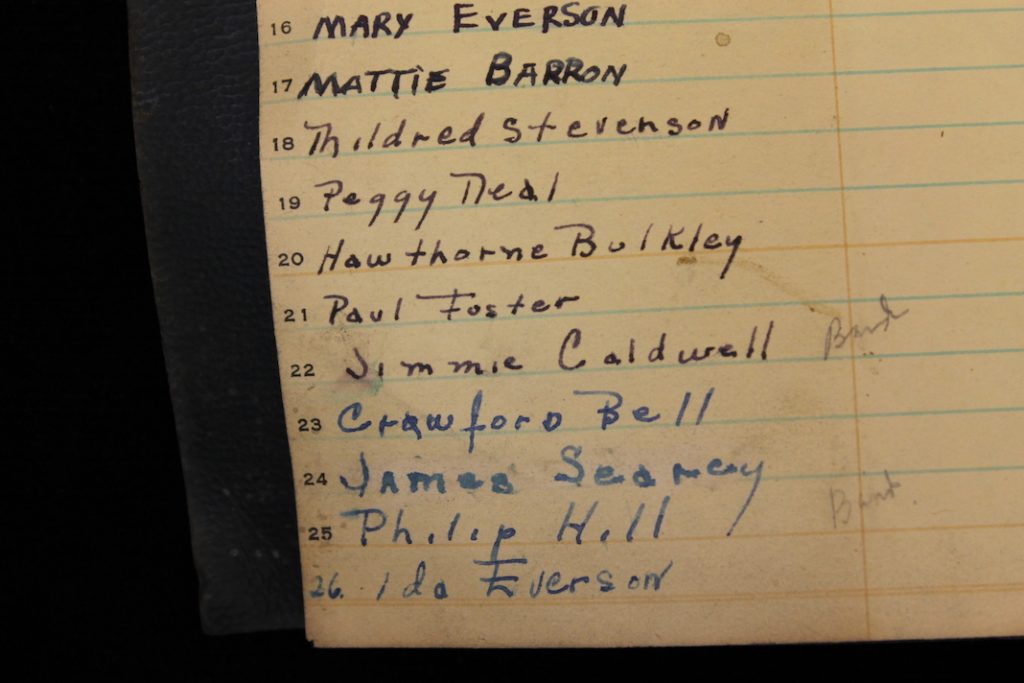
Detail of image of payroll ledger listing the two house band leaders at The Bird in 1948, Jimmy Caldwell and Phil Hill.
Jimmie Caldwell
Lodi Carr*, voice
Eddie Chambliss* (1936-1998), saxophone
Ralph Clark*, drums
Johnny Cleaver*, drums
Alice McLeod Coltrane*, piano
Austin Cromer*, voice
Cleophus Curtis*, trumpet
Devon Cunningham, percussion
Edwin “Youngblood” Davis
Will Davis*, piano
Lefty Edwards*, saxophone
Otis “Candy” Finch*, drums
Eli Fontaine*, saxophone
Frank Foster*, saxophone
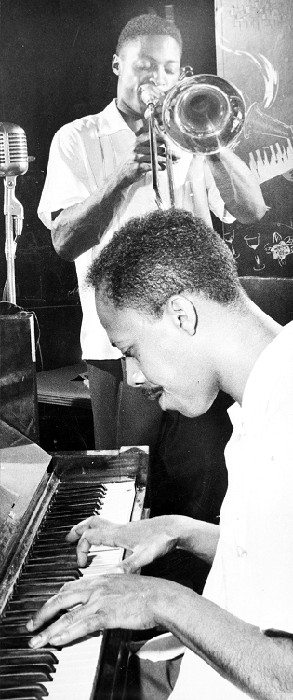
“Curtis Fuller & Tommy Flanagan at Kleins Show Bar.” via Virtual Motor City (click on image for more info)
Frank Gant*, drums
Gerald Gates*
Joe Gordon*, trumpet
Said pianist Harold McKinney, who sat in but never played regularly with the band: “We used to have some really wild jam sessions and cutting contests (where musicians would take turns soloing, trying to best one another). Notably among them was a sort of horn duo between Joe Gordon and Thad Jones; those horn duos really created a lot of excitement.” (Quoted in Heron 1980)
Al Grey*, trombone
Wardell Gray*, saxophone
Willie Green*, bass
Charles Greenlee*, trombone
Johnny Griffin*, saxophone
Kenneth “Pancho” Hagood*, vocalist
Lamonte Hamilton*, saxophone
James Hankins*, bass
John Hare*, trombone
Billy Hardy*, drums
Barry Harris*, piano
Joe Harris*, drums
Teddy Harris, Jr.* (1934-2005), saxophone and piano
Wendell Harrison*, saxophone / clarinet
Monograph on Wendell Harrison via The Kresge Foundation (2018)
Marion Hayden, bass
Profile via Kresge Arts in Detroit (2016)
Louis Hayes* (b. 1937), drums
Joe Henderson*, saxophone
Warren Hickey*, saxophone
Roderick Hicks*, bass
Phil Hill*, piano
“I lived on the next street over from the Bluebird [sic] and down three blocks. When they started having music there, it was mostly friends of mine, like Beans Richardson, Phil Hill; we all went to school together. They started doing music there before I turned 21, actually, in 1941, right before the war.” (Porter Crutcher, quoted in Dulzo 1998)
Lonnie Hillyer*, trumpet
Major “Mule” Holley*, bass
Tate Houston*, saxophone
Charles Humboldt*
Ali Muhammad Jackson*, bass
Alvin Jackson*, bass
Lawrence “Jacktown” Jackson*, drums
Milt Jackson (1923-1999), vibraphone*
Oliver “Bops Junior” Jackson*, drums
James Jamerson*, bass
Eddie Jamison*, saxophone
Dave Jones*
Elvin Jones, drums*
Felton Jones*, trumpet
Hank Jones*, piano
Thad Jones (1923-1986)*, trumpet
Archives at Living Jazz Archives, NJ
Sheila Jordan*, voice
Ralph Kirk*
Sylvester “Sonny Red” Kyner*, saxophone
Hugh Lawson*, piano
Yusef Lateef* (1920-2013), multi-instrumentalist
Ella “Black Beauty” Lee (1915-1976), vocals
Kirk Lightsey*, piano
Clifford Mack*, drums
Art Mardigan*, drums
Al Martin*, bass
Malvin McCray*, saxophone
Harold McKinney* (1928-2001), piano
Ray McKinney*, bass
Earl “Shams” McKinney*
Charles McPherson*, saxophone
Freddie “Fru” Metcalf*
Willie Metcalf*, piano
Billy Mitchell* (1927-2001), saxphone
“It was the main jazz place of the era,” Mitchell once said. “It was the place where everybody who was anybody when they came to Detroit, that was where they played. For example, if Dizzy [Gillespie] was coming through town or Miles [Davis]. It was the musical center of Detroit.” — Heron, W. Kim, Detroit Free Press, Mitchell’s musical road leads home,” 1981
Sherman Mitchell*, trombone
Wild Bill Moore*, saxophone
Frank Morelli*, saxophone
“Moon” Mullins*
Bert Myrick*, drums
Stoney Nightengale*
Buford Oliver*, drums
Noel Paige*
Terry Pollard*, piano
Norman Potgrantz*
Sonny Red, saxophone
Della Reese* (1931-2017), voice
Leon “Grits” Rice*, drums
James “Beans” Richardson*, bass
Eddie Robinson*
Claire Rocquemore*, trumpet
Frank Rosolino*, trombone
Ted Sheely*, piano
Clarence Sherrill*, bass
Alma Foster Smith*, voice and piano
Alma Smith oral history interview (1989)
Ted Sheely*, piano
Singing Sam Smith*
John Sofinney*
Ulysses “Skeeter” Spike*
Sonny Stitt*, saxophone
Gene Taylor*, bass
Lucky Thompson*, saxophone
Joe Thurmond*
Donald Towns*
Rudy Tucich*, drums
Otis “Boo Boo” Turner*
Donald Walden*, saxphone
Doug Watkins*, bass
Julius Watkins*, French horn
Willie Wells*
Art Williams*
Earl Williams*
Lawrence Williams*, drums
Leon Williams*
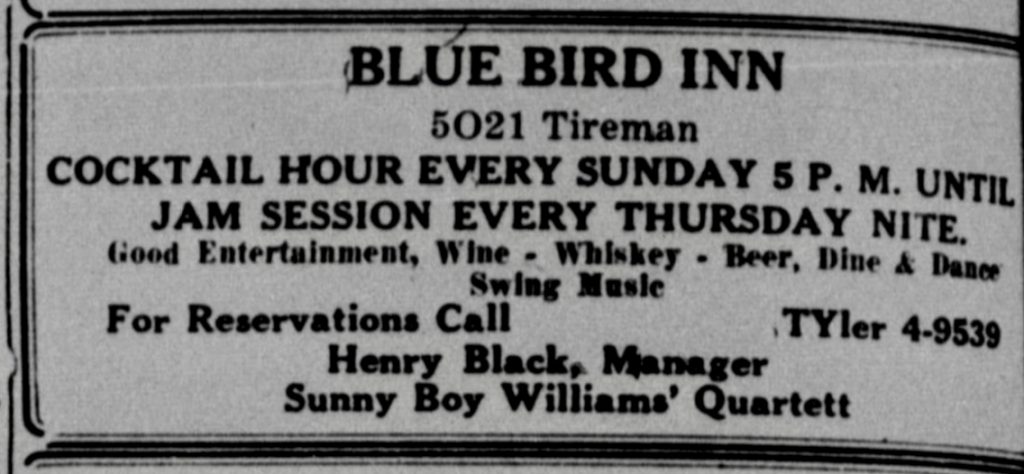
One of the first advertisements for the “Blue Bird Inn” in the Detroit Tribune. “Blue Bird Inn / 5021 Tireman / Cocktail hour every Sunday 5 P.M. Until… Jam session every Thursday nite [sic].” (The Detroit Tribune., April 30, 1938, Page PAGE TEN, Image 10)
Sunny Boy Williams
Kenneth “Koki” Winfrey*, saxophone
Bill “Vishnu” Wood*
Woody Woodhouse*
Ade Woodley*, vibraphone
Rodney Whitaker, bass
Herman Wright*, bass
Wayne Wright*, guitar
Kiane Zawadi (Bernard McKinney)*, trombone
Photos of the McKinney Family performing together, including Kiane Zawadi, by Mark Ladenson
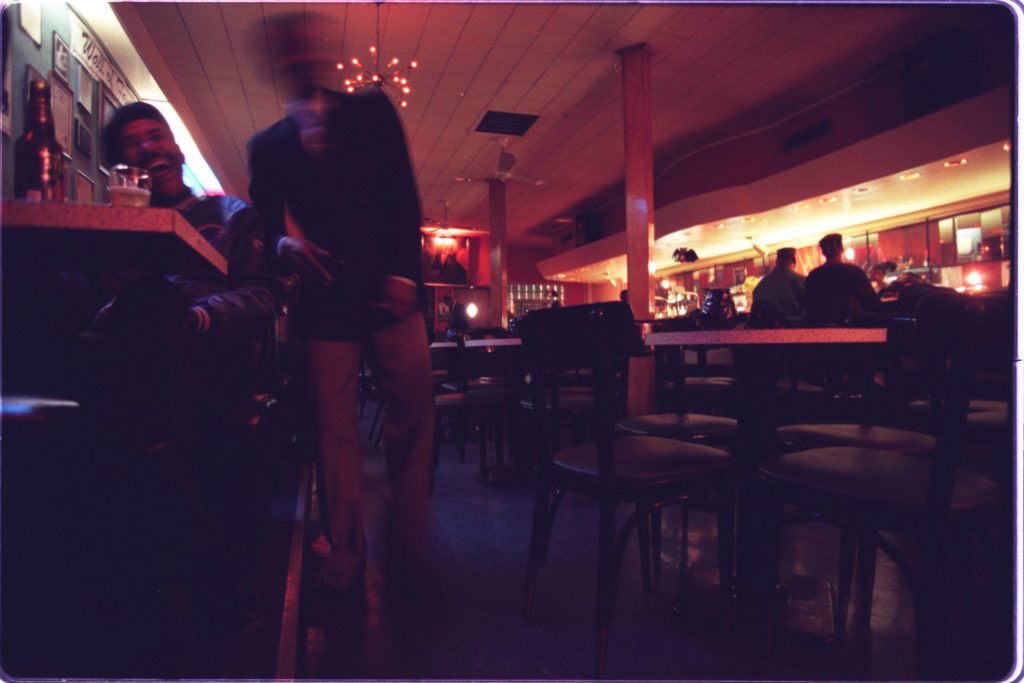
Detroit Free Press, November 3, 1996 . Exterior and interior photo credits: David P. Gilkey (1966-2016). Courtesy of Detroit Free Press.
Blue Bird National Alumni
Junior Cook, saxophone
Miles Davis*, trumpet
“One night Miles played a number so sweet in here you couldn’t even hear nothing else,” [Clarence] Eddins says. “It put you in a solitude thing. The place was packed and it sounded like nobody was in here. Sweet, deep, mellow tone — nobody was opening his mouth until after he was finished.” (Jim Dulzo, “Remembering the bebop at the Blue Bird,” Detroit News 26 September 1992)
Dizzy Gillespie, trumpet
Source: Barry Harris: The Spirit of Bebop
Thelonious Monk (1917-1982), piano
Source: Devon Cunningham (Phone Interview, 16 December 2019)
October 1, 1949: Charlie Parker sits in at The Bird. Plays “Now’s The Time.” (Charlie Parker Chronology)
Source: Barry Harris: The Spirit of Bebop
Horace Silver, piano
Jimmy Smith, organ
Source: Barry Harris, American Black Journal (1981)
Source: Barry Harris: The Spirit of Bebop
Sources
* Programs, The Societie of the Culturally Concerned (founded by Barbara Cox in 1980) presents:
— “Detroit Salutes Clarence Eddins and his legendary Blue Bird Inn,” October 6, 1991. The original list was two lists, the first entitled “Bluebird [sic] Music Alumni” (“Still Swingin'”) and “Bluebird Emeritus” (“Over The Rainbow”). Miles Davis (1926-1991) was listed as “Honorary Emeritus.”
— “The Blue Bird Reunion 4 Honoring Barry Harris and Charles McPherson,” September 25, 1994.
— The list has been copy edited, annotated, alphabetized, and hyperlinked to Wikipedia wherever possible.
Works Cited
Gary Blonston. “The All-Detroit Jazz All-Stars,” Detroit Free Press Magazine, 17 September 1967.
Herb Boyd and Leni Sinclair. Detroit Jazz Who’s Who. Jazz Research Institute, 1984.
C. Lorin Brace VI. “‘Nothing Phone About it in Any Way’: Archaeological Analysis of the Blue Bird Inn Jazz Club in Post-War Detroit,” Masters Thesis, Wayne State University, May 2016.
Jim Dulzo. “Great Moments in Detroit Jazz,” Hour, September 1998.
The Westsiders, Remembering Detroit’s Old Westside: 1920-1950, 1997.

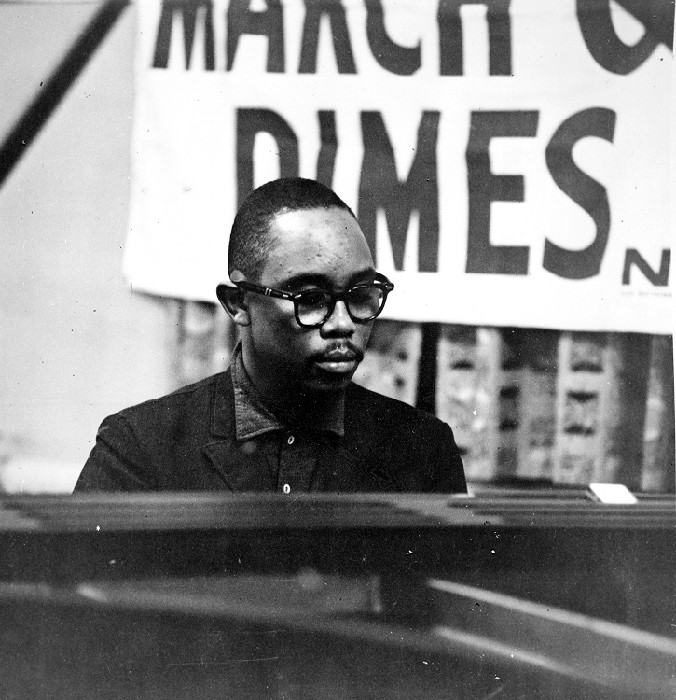
Bill McLarney
We’re well into 2020 so maybe this is too late to matter. I shared another comment with a web page which may have been this one, got no response. But no harm in trying.
I lived in and around Detroit ca. 1962-1970, while attending U. of Michigan. I spent more time in Detroit than Ann Arbor precisely because of the music available in Detroit. I owe as much of my education to “inner city” Detroit and the music scene as I do to the university. One of my major classrooms was the Bluebird. I certainly got to know Clarence, Ernie, John Hair, etc. etc.
I arrived too late for the Bluebird’s glory years, but attended class regularly during Ernie Farrow’s tenure as leader of the house band and after. On a brief visit to Detroit some years after I caught Clarence Beasley’s trio on an afternoon matinee (attended by maybe 4 paying customers), admired the Wall of Fame (which I hope has been preserved) and chatted with Clarence’s daughter.
Professionally I am a biologist, but certainly I know history when I see it. The Bluebird deserves whatever recognition it can get as a historic/cultural site. To the extent that one person’s voice in support counts, here it is.
Coda: The task of compiling a list of Bluebird alumni is certainly endless and thankless, but I would point out one serious omission. Bassist Robert Allen took over Ernie Farrow’s group for some time after Ernie’s shocking and tragic death. I would also wager that I heard drummers James Youngblood and Ed Nelson and bassist Dedrick Glover there – certainly I was at the Bluebird with them.
Thank you for your efforts.
Dr. Bill McLarney
Franklin, North Carolilna
Michelle Jahra McKinney
Thanks so much for your testimony! At some point I would love you to record an oral history of your experiences at The Bird. I would love to hear your take on the atmosphere and the musicians & patrons – did vocalists partake in the jam sessions? Was Farrow’s stint as house bandleader before or after he played in Yusef Lateef’s band – what year did you see him there, if you can remember? Where was the Wall of Fame inside of Blue Bird Inn? PLEASE get in touch – I am reachable at info[at]detroitsound.org or jahramack[at]detroitsound.org – Loving it! Michelle Jahra McK